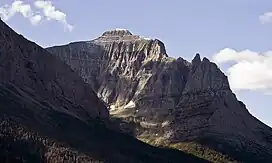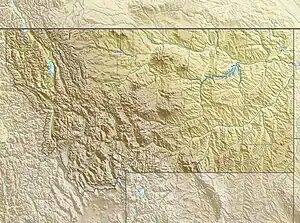Little Chief Mountain
Little Chief Mountain (9,546 feet (2,910 m)) is located in the Lewis Range, Glacier National Park in the U.S. state of Montana.[1][3] Little Chief Mountain is easily seen from the Going-to-the-Sun Road, rising to the south of Saint Mary Lake. Little Chief Mountain was named in 1887 by George Bird Grinnell for his friend, Frank North, U.S. Army.[4] "Little Chief" was his Pawnee name, given to him by his Pawnee Scouts.
| Little Chief Mountain | |
|---|---|
 Little Chief Mountain, northeast aspect | |
| Highest point | |
| Elevation | 9,546 ft (2,910 m)[1] |
| Prominence | 1,781 ft (543 m)[1] |
| Parent peak | Blackfoot Mountain[1] |
| Listing | Mountains in Glacier County, Montana |
| Coordinates | 48°38′41″N 113°35′42″W[2] |
| Geography | |
 Little Chief Mountain Location in Montana  Little Chief Mountain Location in the United States | |
| Location | Glacier County, Montana, U.S. |
| Parent range | Lewis Range |
| Topo map | USGS Rising Sun, MT |
| Climbing | |
| First ascent | 1894 (Henry L. Stimson)[1] |
Climate
Based on the Köppen climate classification, Little Chief Mountain is located in a subarctic climate zone characterized by long, usually very cold winters, and short, cool to mild summers.[5] Winter temperatures can drop below −10 °F with wind chill factors below −30 °F.
Geology
Like other mountains in Glacier National Park, Little Chief Mountain is composed of sedimentary rock laid down during the Precambrian to Jurassic periods. Formed in shallow seas, this sedimentary rock was initially uplifted beginning 170 million years ago when the Lewis Overthrust fault pushed an enormous slab of precambrian rocks 3 mi (4.8 km) thick, 50 miles (80 km) wide and 160 miles (260 km) long over younger rock of the cretaceous period.[6]
Gallery
See also
References
- "Little Chief Mountain, Montana". Peakbagger.com. Retrieved December 26, 2018.
- "Little Chief Mountain". Geographic Names Information System. United States Geological Survey, United States Department of the Interior. Retrieved December 26, 2018.
- Rising Sun, MT (Map). TopoQwest (United States Geological Survey Maps). Retrieved December 26, 2018.
- Through The Years In Glacier National Park An Administrative History, NPS.gov
- Peel, M. C.; Finlayson, B. L. & McMahon, T. A. (2007). "Updated world map of the Köppen−Geiger climate classification". Hydrol. Earth Syst. Sci. 11: 1633–1644. ISSN 1027-5606.
- Gadd, Ben (2008). Geology of the Rocky Mountains and Columbias.
External links
- National Park Service web site: Glacier National Park
- Little Chief Mountain weather: Mountain Forecast


